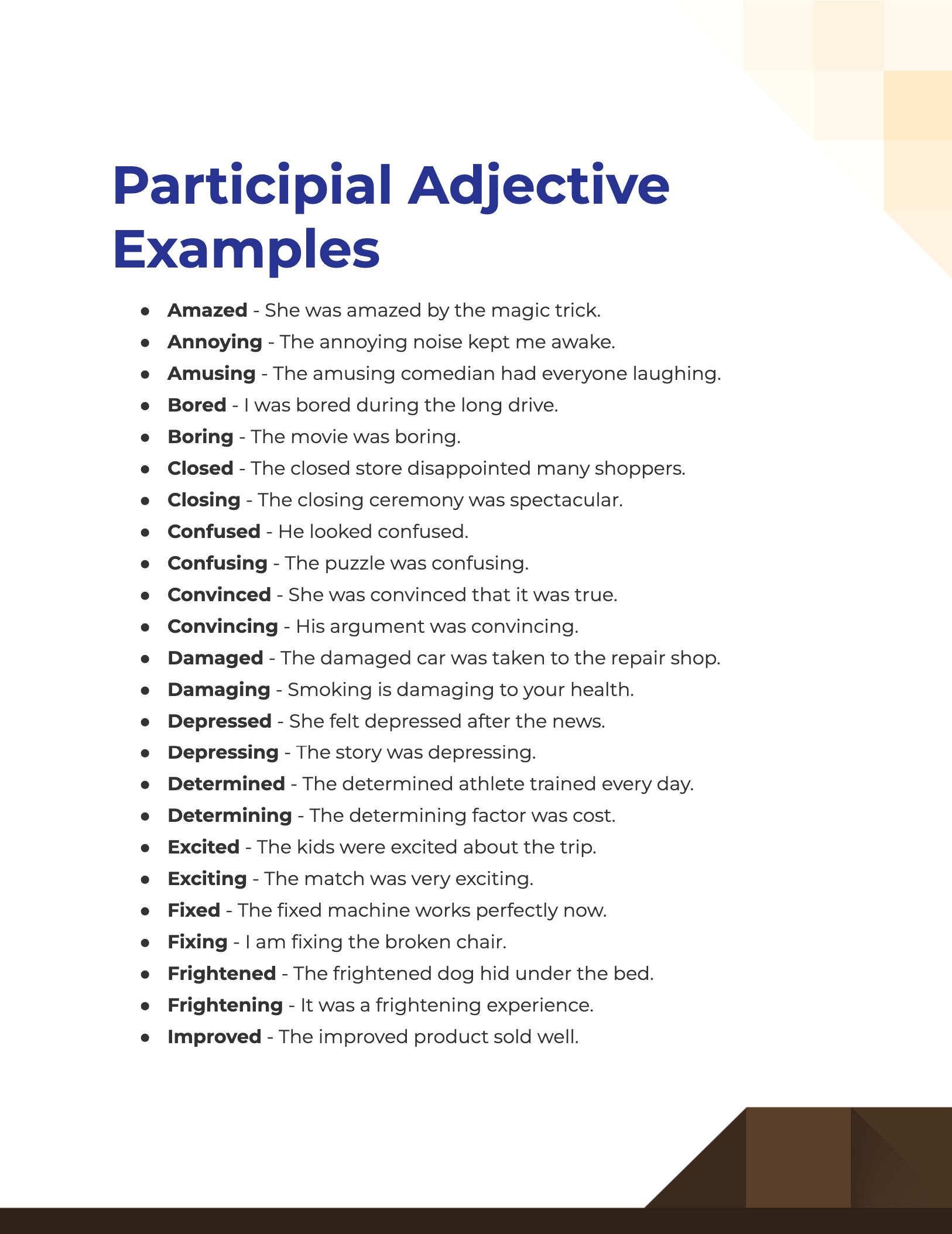Participial Adjective
Unlock the potential of your sentences by mastering the use of participial adjectives. These unique adjectives derived from verbs can add depth and complexity to your writing. In this guide, we’ll explore participial adjectives in detail, offering definitions, adjective examples, and step-by-step instructions for their effective usage.
What is the Participial Adjective? – Definition
A participial adjective is a type of adjective that is formed from a verb and usually ends in “-ing” or “-ed.” While similar in form to present and past participles, they function as adjectives to describe nouns.
What is the Best Example of a Participial Adjective?
- Boring: The boring lecture made me fall asleep.
- Excited: I am excited about the upcoming concert.
In these examples, “boring” and “excited” are participial adjectives that describe the nouns “lecture” and “I” respectively.
100 Participial Adjective Examples

Delve into the rich world of participial adjectives with these examples. They offer a glimpse into how versatile and expressive these adjectives can be in augmenting your sentences.
- Amazed – She was amazed by the magic trick.
- Annoying – The annoying noise kept me awake.
- Amusing – The amusing comedian had everyone laughing.
- Bored – I was bored during the long drive.
- Boring – The movie was boring.
- Closed – The closed store disappointed many shoppers.
- Closing – The closing ceremony was spectacular.
- Confused – He looked confused.
- Confusing – The puzzle was confusing.
- Convinced – She was convinced that it was true.
- Convincing – His argument was convincing.
- Damaged – The damaged car was taken to the repair shop.
- Damaging – Smoking is damaging to your health.
- Depressed – She felt depressed after the news.
- Depressing – The story was depressing.
- Determined – The determined athlete trained every day.
- Determining – The determining factor was cost.
- Excited – The kids were excited about the trip.
- Exciting – The match was very exciting.
- Fixed – The fixed machine works perfectly now.
- Fixing – I am fixing the broken chair.
- Frightened – The frightened dog hid under the bed.
- Frightening – It was a frightening experience.
- Improved – The improved product sold well.
- Improving – The company is continuously improving its services.
- Included – The included accessories were useful.
- Including – The meal, including dessert, was delicious.
- Interested – She is interested in history.
- Interesting – The lecture was interesting.
- Irritated – He was irritated by the noise.
- Irritating – The constant interruptions were irritating.
- Loaded – The loaded truck left for the warehouse.
- Loading – The workers are loading the ship.
- Missed – The missed opportunity can’t be recovered.
- Missing – The missing cat was found.
- Moved – He was moved by the speech.
- Moving – The movie had a moving storyline.
- Packed – The packed stadium cheered for the team.
- Packing – She is packing her suitcase.
- Painted – The painted wall looked fresh.
- Painting – I am painting my house.
- Prepared – We are prepared for the exam.
- Preparing – She is preparing dinner.
- Received – The received gifts were lovely.
- Receiving – The company is receiving good reviews.
- Reduced – The reduced prices attracted many customers.
- Reducing – We are reducing waste by recycling.
- Refreshed – I felt refreshed after the shower.
- Refreshing – The refreshing drink cooled us down.
- Relaxed – He looked relaxed during the interview.
- Relaxing – The spa was a relaxing place.
- Removed – The removed stain made the shirt look new.
- Removing – They are removing the old furniture.
- Repaired – The repaired road is now safer.
- Repairing – The mechanics are repairing the engine.
- Ruined – The ruined painting couldn’t be restored.
- Ruining – The rain is ruining the picnic.
- Scared – The scared child clung to his mother.
- Scaring – The ghost stories were scaring the kids.
- Shared – The shared experiences brought us closer.
- Sharing – They are sharing the food among themselves.
- Shocked – I was shocked by the news.
- Shocking – The shocking event left everyone stunned.
- Stopped – The stopped clock needs fixing.
- Stopping – The bus is stopping at the next station.
- Stressed – She was stressed during the exams.
- Stressing – The teacher is stressing the importance of homework.
- Stunned – The stunned audience clapped in awe.
- Stunning – The view from the mountain was stunning.
- Surprised – He was surprised by the party.
- Surprising – The test results were surprising.
- Tired – The tired workers deserved a break.
- Tiring – The long hike was tiring.
- Trained – The trained dog followed all commands.
- Training – The athletes are in training for the event.
- Used – The used car was in good condition.
- Using – They are using eco-friendly materials.
- Washed – The washed clothes smell good.
- Washing – She is washing her car.
- Watched – The watched pot never boils.
- Watching – The kids are watching TV.
- Worried – The worried mother waited for her child.
- Worrying – The situation is worrying.
- Wrapped – The wrapped gift looked beautiful.
- Wrapping – She is wrapping the presents.
- Written – The written test was difficult.
- Writing – I am writing an article.
- Zoned – The zoned areas are for residential use.
- Zoning – The city council is zoning the new development.
- Astonished – The astonished crowd gave a standing ovation.
- Astonishing – The magician performed an astonishing trick.
- Fulfilled – The fulfilled order arrived on time.
- Fulfilling – The job is very fulfilling.
- Hated – The hated villain was finally defeated.
- Hating – He is hating the new policy.
- Loved – The loved teacher received many gifts.
- Loving – The loving family supported each other.
- Played – The played song was her favorite.
- Playing – The kids are playing in the yard.
- Read (pronounced ‘red’) – The read book was put back on the shelf.
By incorporating these participial adjectives into your writing, you can make your sentences more vibrant and engaging.
Participial Adjective Examples to Describe a Person
These participial adjectives paint a vivid picture of the emotional or physical state of the person being described, adding depth and nuance to your writing.
- Enlightened – The enlightened guru shared wisdom with his followers.
- Disturbed – The disturbed individual refused to listen to reason.
- Enthralled – The enthralled artist was lost in his painting.
- Overwhelmed – She felt overwhelmed by her responsibilities.
- Dejected – The dejected employee left the meeting room.
- Intrigued – The intrigued detective couldn’t stop thinking about the case.
- Relieved – The relieved mother hugged her lost child.
- Motivated – The motivated student finished his assignments early.
- Outraged – The outraged citizen protested against the unfair law.
- Rejuvenated – After the holiday, he came back to work rejuvenated.
How Do You Identify Participial Adjectives?
Participial adjectives are adjectives that look like verbs but function as descriptive words in sentences. They are derived from participles, which are forms of verbs that can act as adjectives. To identify a participial adjective, look for words that are used to describe nouns and pronouns and are based on verb forms. They typically end in “-ing” (present participles) or “-ed” (past participles), although some irregular forms exist. Key indicators include:
- Placement: Participial adjectives usually come before a noun or after a linking verb.
- Endings: Look for the “-ing” or “-ed” suffixes, like “boring” or “bored.”
- Function: The word must be serving as an adjective, modifying a noun or pronoun.
- No Helping Verbs: Participial adjectives do not have helping verbs like “is,” “am,” “are” before them.
What is a Participle Phrase as an Adjective?
A participle phrase is a group of words that starts with a participle and acts as an adjective in a sentence. The phrase can include the participle, an object, and the object’s modifiers. It provides additional information about a noun, usually adding descriptive, spatial, or temporal context.
Here are some examples to illustrate:
- Running across the field, the player caught the ball. (Describes the player)
- Excited by the news, Sarah couldn’t stop smiling. (Describes Sarah)
- Built by ancient civilizations, the monument has stood for thousands of years. (Describes the monument)
In these examples, the participle phrases function as adjectives, describing nouns in various ways. Note that the participle phrase should be placed as close as possible to the noun it modifies to avoid confusion.
Exercises to Practice Participial Adjectives
To gain a firm grasp of participial adjectives, it’s beneficial to engage in various exercises. Below are some practice exercises designed to enhance your understanding and application of participial adjectives:
Exercise 1: Fill in the Blanks
Complete the following sentences with appropriate participial adjectives.
- The movie was so _______ (bore/boring) that I fell asleep.
- She felt _______ (exhaust/exhausted) after the marathon.
- The news is _______ (shock/shocking).
Exercise 2: Convert Sentences
Convert the following sentences to include a participle phrase as an adjective.
- The dog barked. It was angry.
- The artist painted the canvas. She is talented.
- The cake smells good. It is freshly baked.
Exercise 3: Identify Participial Adjectives
Identify the participial adjectives in the following sentences.
- The whispered words were meant only for her ears.
- The burning candle flickered in the wind.
- Her laughing face brightened the room.
Exercise 4: Correct or Incorrect
Mark the following sentences as correct or incorrect based on the use of participial adjectives.
- She is interesting listened to.
- The broken window needs fixing.
- They are bored of waiting.
Exercise 5: Create Your Own Sentences
Create sentences using the given participial adjectives.
- Amazed
- Frightening
- Charmed
These exercises can serve as an effective means to practice and identify participial adjectives, enabling you to use them correctly and confidently.
How to Use a Participial Adjective? – Step by Step Guide
- Identify the Verb: Start by identifying the verb that expresses the action or state you want to convert into an adjective.
- Example: To bore
- Form the Participial Adjective: Create the adjective by adding the suffix “-ing” or “-ed” to the verb.
- Example: Boring or Bored
- Placement: Place the participial adjective before the noun it describes or after a linking verb.
- Example: Boring lecture or The lecture is boring.
- Avoid Confusion: Make sure the participial adjective is clearly functioning as an adjective and not as a verb in the sentence.
- Agreement: Ensure subject-verb agreement when the participial adjective follows a linking verb.
- Example: She is excited. (NOT She are excited.)
- Test: To verify, you can generally swap a participial adjective with a regular adjective and the sentence should still make sense.
- Example: The interesting book (NOT The interest book).
Tips for Using Participial Adjective
- Understand the Context: Make sure you choose the correct form (“–ing” or “–ed”) based on what or who the adjective is describing.
- Be Concise: Avoid using too many adjectives in a single sentence. One well-placed participial adjective is often more effective.
- Review and Revise: After writing, review your sentences to check for accuracy and clarity in the use of participial adjectives.
By following these tips and guidelines, you’ll be well on your way to mastering the art of using participial adjectives to enrich your language and make your writing more dynamic.



